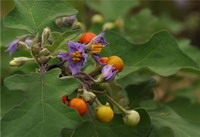
Solanum trilobatum |
 |
Govindan, S., S. Viswanathan, V. Vijayasekaran and R. Alagappan. 1999. A pilot study on the clinical efficacy of Solanum xanthocarpum and Solanum trilobatum in bronchial asthma, Journal of Ethnopharmacology 66: 205-210. Abstract; Solanum xanthocarpum and Solanum trilobatum are widely used to treat respiratory diseases in southern Indian traditional medicine (Siddha). A pilot study was undertaken to investigate the clinical efficacy and safety of a single dose of the above herbs in mild to moderate bronchial asthma. The respiratory functions (FVC, FEV1, PEFR and FEF25–75%) were assessed by using a spirometer prior to and 2 h after oral administration of 300 mg powder of whole plant of either S. xanthocarpum or S. trilobatum. Standard bronchodilator drugs, salbutamol (4 mg) and deriphylline (200 mg) were used for comparison. Treatment with either S. xanthocarpum or S. trilobatum significantly improved the various parameters of pulmonary function in asthmatic subjects. However, the effect was less when compared to that of deriphylline or salbutamol. No untoward effects were reported during the study. The results of the present study confirm the traditional claim for the usefulness of these herbs in bronchial asthma. More detailed studies are required to investigate the mechanism of action and therapeutic utility of S. xanthocarpum and S. trilobatum. ..........................................................................................................................
Govindan, S., S. Viswanathan, V. Vijayasekaran and R. Alagappan. 2004. Further studies on the clinical efficacy of Solanum xanthocarpum and Solanum trilobatum in bronchial asthma. Phytother Research 18, 10: 805-809.
Abstract; The clinical efficacy of two herbs S. xanthocarpum and S. trilobatum in a dose of 300 mg tds for 3 days was investigated in mild to moderate bronchial asthma. Their effect was compared with standard bronchodilator drugs, salbutamol (4 mg) and deriphylline (200 mg). The respiratory function was assessed by measuring the peak expiratory flow rate (PEFR) using a mini peak flow meter. In addition, improvement in lung function was assessed by physical examination (rhonchi and crepitation) and other symptoms such as cough, breathlessness and sputum. S. xanthocarpum and S. trilobatum produced a progressive improvement in the ventilatory function of asthmatic individuals over 3 days. The scores for rhonchi, cough, breathlessness and sputum were decreased by these drug treatments. The improvement in PEFR and the reduction in other symptom scores clearly indicate a bronchodilator effect, a decrease of oedema and secretions in the airway lumen. The response to these herbs can be considered to be equivalent to that of deriphylline but less than salbutamol. No untoward effects were reported during the study. The present study further confirms the traditional use of these herbs in bronchial asthma.
Solanum trilobatum_downloads |
| กลับหน้าหลักสมุนไพร |


